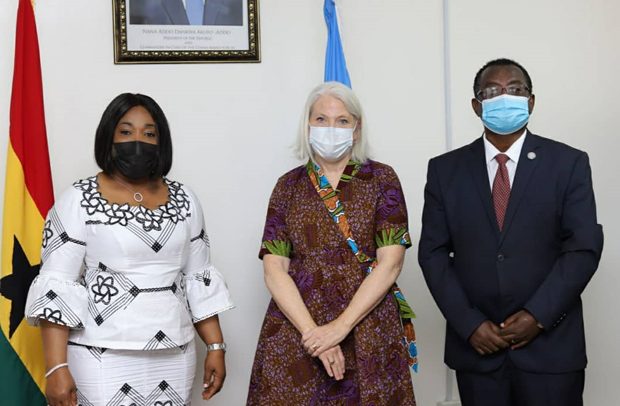The new Ghana Country Representative of the Food and Agriculture Organization (FAO),
Joycelyn Gayden Brown Hall, has presented her Letter of Credence to Minister of Foreign Affairs and Regional Integration, Shirley Ayorkor Botchwey.
Madam Brown Hall called on the Foreign Ministry at the Ministry of Foreign Affairs and Regional Integration in Accra on Friday, March 19, 2021 where she presented her credentials. She was accompanied by Mr. Abebe Haile-Gabriel GebreYohannes, FAO Assistant Director General and Regional Representative for Africa.
In her speech to receive the Letter of Credence, Madam Ayorkor Botchwey noted with appreciation the excellent cooperation that successive Governments of Ghana had enjoyed from the Food and Agriculture Organization since the establishment of its presence in the country in 1978.
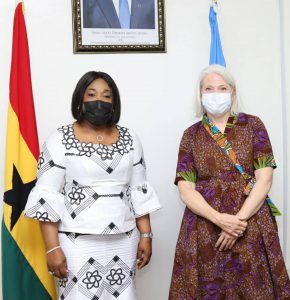
She observed that the state of Ghana’s agricultural sector has largely been influenced by the valuable technical assistance and advice, proffered in the implementation of programmes and projects in the area of food and agriculture, nutrition and natural resource management.
The Minister affirmed that the sector was the largest source of employment in Ghana, comprised of mostly small-holder farmers, whose output are heavily dependent on unpredictable weather conditions, among others.
She said Government accordingly attached great importance to developments in the agricultural sector due to its relevance to poverty reduction, which was key to the attainment of the Sustainable Development Goals (SDGs).
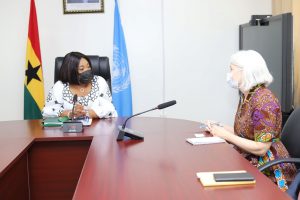
It would be recalled that the Government of Ghana in March, 2020 granted approval for the appointment of Ms. Brown Hall as FAO’s Representative to Ghana.
However, due to the restrictions resulting from the COVID-19 pandemic, Ms. Brown Hall was unable to travel to Ghana to present her Letters of Credence until now.
Madam Ayorkor Botchwey told the new FAO’s rep about the Government of Ghana’s flagship initiatives of ‘Planting for Food & Jobs’, ‘Rearing for Food & Jobs’ and ‘One Village One Dam’, which are all primarily aimed at increasing food production, addressing the issue of food insecurity in the country and the creation of jobs for the youthful Ghanaian population.
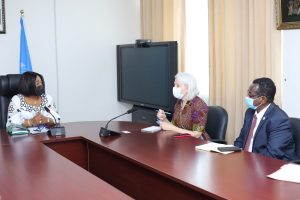
She highlighted the Government’s value addition strategy aimed at rapidly ramping up agro-processing, supplementary to ongoing initiatives to boost food security such as the reduction in retail prices of seeds, provision of subsidized fertilizer, hybrid seeds and agrochemicals to over 42,000 smallholder farmers nationwide.
Also, she spoke about the implementation of a warehouse receipt systems for farmers to assist them to store their harvest, in anticipation of an appreciated price to protect farmers in this period of COVID-19.
She explained that in order for government to achieve the UN recommended ratio of one extension officer to 500 farmers, the Nation Builders Corps (NABCO) established by Ghana has helped to bridge that gap and is currently contributing to the improvement of agricultural production, modernization of agriculture through education to ensure the maximisation of profit to local farmers.
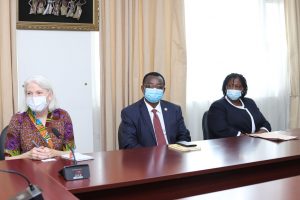
She observed further that plans were far advanced for the revamping of existing mechanization centres with support from the private sector to establish, manage and provide affordable mechanization services to farmers as well as the setting up of greenhouse facilities and the training of the youth in related management.
About Ms. Jocelyn Brown Hall
Ms. Jocelyn Brown Hall, a national of the United States, holds a Master’s of Business Administration (MBA) in International Business and Development from the George Washington University, Washington D.C., USA; and graduated magna cum laude from the Harvard University, Cambridge, Massachusetts, USA, with a Bachelor’s degree in American Literature.
Ms. Brown Hall commenced her career teaching English at an Agricultural University in Peshawar, Pakistan, while she was in the Peace Corps from 1988 to 1990. Thereafter, she ran the largest income generation programme for Afghan women refugees in Pakistan for Save the Children, until she was evacuated from that country during the first Gulf war.
In 1998, she joined the U.S. Department of Agriculture in the Foreign Agricultural Service, where she coordinated USDA’s international development and training programs valued at over US$65 million, with 165 staff members. She was the lead USDA expert on USDA’s technical relationship with international organizations such as FAO, the Inter-American Institute for Cooperation in Agriculture and various international research centers.
In 2005, she became Deputy Administrator in the Foreign Agricultural Service where she led USDA’s US$2 billion food and technical assistance programs in low and middle-income countries. She also coordinated the Department’s contribution to the U.S. government’s Global Food Security Strategy, Water Strategy, Global Nutrition Strategy and Global Health Strategy.
Currently serving as the Deputy Regional Representative for the Regional Office for Africa of the Food and Agriculture Organization of the United Nations (FAO), Ms. Brown Hall oversees the 47 FAO country offices in Africa and guides their strategy and communications around food security, agriculture, climate change, agrifood trade, animal and plant health, among other topics.
She also serves as the FAO Representative for Ghana, and also leads partnership and resource mobilization for the entire Africa region, bringing together civil society, international organization, donors and the private sector to address food security.
By Melvin Tarlue


